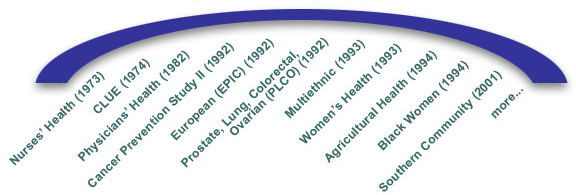Cohort Consortium
The Cohort Consortium (CoCo) was formed by the National Cancer Institute
(NCI) to address the need for large-scale collaborations in order to have sufficient
data and biospecimens to study gene-gene and gene-environment interactions
in the etiology of cancer. The mission is to foster communications, promote
collaborative projects, and identify common challenges and solutions. It provides
a coordinated, interdisciplinary approach to tackling important scientific
questions, economies of scale, opportunities to quicken the pace of research,
and a collaborative network of investigators. (The Cohort Consortium also is sometimes referred to as the Consortium of Cohorts.)
CoCo includes investigators responsible for 37 high-quality cohorts
involving about 3.5 million people. The cohorts are international in scope
and cover large and diverse populations. Extensive risk factor data are available
on each cohort, and biospecimens including germline DNA collected at baseline
are available for about 1.2 million individuals. Investigators team up to use
common protocols and methods and to conduct coordinated parallel and pooled
analyses.
37 Cohorts as of October 2008, About 3.5 Million Individuals

Three major initiatives have been launched by CoCo members thus far and more
are slated to begin soon. Their aim is to identify genetic variants that
differ in frequency in cancer cases and controls and that merit aggressively
pursuing in population, clinical, and laboratory investigations.
- The Breast and Prostate Cancer Cohort Consortium (BPC3)
is conducting collaborating studies of hormone-related gene variants and
environmental factors involved in the development of breast and prostate
cancer. This research involves 10 cohorts and pooled data on 8,850 patients
with prostate cancer and 6,160 patients with breast cancer. The goal is to
characterize common variations in about 50 candidate genes that mediate the
steroid hormone metabolism and insulin-like growth factor signaling pathways,
and associate these variations with cancer risk.
The investigators described their approach in Nature
Reviews Cancer (Dec.2005).
The BPC3
is CoCo’s first initiative and began in 2003. It is funded through grants
from NCI’s Epidemiology and Genetics Research Program (EGRP) for participation
of the extramural (non-NCI) cohorts and by NCI’s
Division of Cancer Epidemiology and Genetics (DCEG), which is the intramural
(in-house) epidemiology research component of the Institute and manages two
of the participating cohorts.
- The Vitamin D Pooling Project Rarer Cancer Consortium (VDPP Consortium) is conducting analyses of associations between serum vitamin D concentrations (25-hydroxyvitamin D (25(OH)D) and development of certain rarer cancers – pancreatic, ovarian, upper gastrointestinal, endometrial, and renal cancers, and lymphoma. This nested case-control study includes about 5,100 cases and 5,100 matched controls from 10 participating cohorts. The participation of eight of the cohorts was funded by EGRP beginning in the fall of 2007, and two of the cohorts are supported by DCEG.
- The Pancreatic Cancer Cohort Consortium (PanScan)
is conducting whole genome scans of common genetic variants in 1,200 pancreatic
cancer cases and 1,200 controls from 12 cohorts to identify markers of susceptibility
to pancreatic cancer. The promising genetic variants (single nucleotide polymorphisms
(SNPs) identified then will be validated by testing data from participants
in a pancreatic cancer case-control consortium. The Whole Genome Scan
for Pancreatic Cancer Risk (PanScan) Study began in September 2006. Funding
is provided through grant support from EGRP for the extramural cohorts and
by DCEG for its two participating cohorts.
- The Cancer Genetic Markers
of Susceptibility (CGEMS) Project is conducting
scans of the entire human genome to identify common, inherited gene mutations
that increase the risks for prostate and breast cancer. Each whole
genome scan will analyze about 1,200 prostate cancer cases and 1,200 controls
and an equivalent number of breast cancer cases and controls. Promising
SNPs then will be validated in a series of nested case-control studies from
large, ongoing population-based cohort studies of DCEG. Launched in
early 2006, CGEMS is a project of DCEG and NCI’s Core Genotyping Facility
and Office of Cancer Genomics.
Contact Us
To discuss potential consortia arrangements, investigators may
contact Daniela Seminara, Ph.D., M.P.H., Scientific Consortia Coordinator, Office of the Associate Director, EGRP.
View information about existing
EGRP-funded cohorts.
DCEG is a partner in this initiative.
|
|

